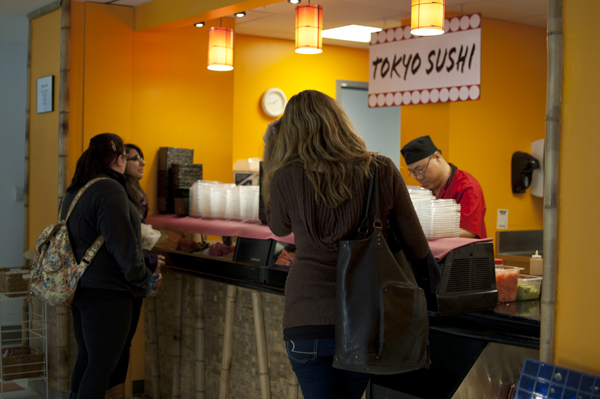

The Student Association (SA) Executive Vice President Eve Stern presented issues on Tuesday, Feb. 14 to the SA about the current meal plans available to the campus community and offered suggestions for improvements.
“At the end of the day, the Campus Auxiliary Services (CAS) board works for the school, so if we need to see certain things on campus there should not be an issue,” Stern said.
Stern expressed concerns about the amount of freedom students have within their meal plan and the prices of the New Paltz plan as compared to other SUNY schools — New Paltz has one of the least costing meal plans in the SUNY system — in quality, variety and professionalism with the dining services provided by Sodexo.
She said it is unfair that first-year students are required to have the Carte-Blanch meal plan, which gives the students unlimited blocks for Hasbrouck and only 50 dining dollars per semester. She said she understands that the Carte-Blanch meal plan gives Hasbrouck financial security to continue running because without this meal plan, fewer students would eat there.
“There is a noted trend that students would rather have more freedom in dining dollars than be forced to be used a certain number of blocks per week, whether it is the meal exchange or Hasbrouck,” Stern said.
Stern is trying to get the CAS board members to develop a plan that will satisfy both the needs of the students and the financial needs of the dining services.
Currently, the SUNY New Paltz meal plan is $1,730, which is the second lowest meal plan compared to other SUNY schools. Stern said this may account for the lack of quality and limited variety in the food offered.
“I believe that $1,730 is too much money for the quality of food that we get,” first-year political science major Oladoyin Olanrewaju said.
Stern suggested that outside vendors, such as Tokyo Sushi in the Student Union, are top choices for students which may reflect the quality of their food and services.
“I feel like because it is on campus the jobs aren’t treated as professional jobs — people don’t cook food wanting to cook food they just make the food,” Stern said. “The standards of our food on campus are not held up to the same standards as if I were to go into town to get a meal. I feel like students would be willing to pay more money if there was a guaranteed increase in quality of the food.”
Stern said she does not want to see the dining services turn into schools such as “SUNY Albany with a Wendy’s” and other unhealthy food options, but she would like to give students better meal options for a price that fits the quality whether that involves raising the cost of meal plans or not.
Stern said the contract with the current vendor, Sodexo, will be ending in about a year and the CAS board has hired Envision Strategies, a consultation firm, to help them pick the best vendor using student surveys. Based on these surveys, sent out in a mass email to the student body on March 5, the CAS board said they might will possibly change the vendor from Sodexo to another vendor such as Chart Wells or Ara Mark.
“The survey is a good way to find out the input of the students, however, it remains to be seen if they are actually going to listen to what we have to say,” Olanrewaju said.
Stern is working closely with other students such as Catlin O’Donnell, Melanie Glenn and John Freifeld who were chosen by SA to help develop alternatives to the current meal plan.
Stern said she expects small changes to begin within the month of March while the bigger changes will depend when the new contractor is revealed.
“Students are more apprehensive about paying more money because they do not want to pay more money and still have crappy food,” Stern said. “At the end of the day, if paying an extra hundred dollars on your meal plan makes a vast difference in quality and service, I think it would help.”
